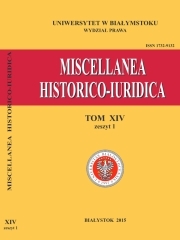Sposoby odzyskania dóbr ziemskich zabranych przez panującego w Polsce od XIII do połowy XV w.
The Ways of Recovering Immovable Property Taken Away Unlawfully by the Authority in Poland from the Thirteenth to mid-Fifteenth Century
Author(s): Krzysztof Goźdź-RoszkowskiSubject(s): Law, Constitution, Jurisprudence, History of Law
Published by: Wydawnictwo Uniwersytetu w Białymstoku
Keywords: landed gentry property restitution; medieval Poland; clergy; knights
Summary/Abstract: This paper aims to present the various ways used by secular persons (knights and the gentry) and church institutions to recover immovable property taken from them unlawfully (nullo iure) by the rulers in medieval Poland (from the 13th until the mid-15th century). Attempts to recover such property were made by applying to the ruler in his or her judicial capacity competent in matters related to immovable property or by seeking his or her consent for restitution by means of unofficial requests. Such attempts also involved suing persons for the recovery of property sold to them by the ruler. Bishops and monasteries would also file complaints with the Pope, who would then appoint judges from among the clergy to hear the case. The judges could then refer such cases to an arbitration court, opt for a conciliatory agreement or they could resort to institutional acts of religious censure against the offending ruler, such as excommunication or an interdict. Legal historians would be particularly interested in those ways of recovering property that could collectively be called “legal proceedings”. Further research should be directed at exploring legal proceedings for restitution, both in monarch courts and church courts.
Journal: Miscellanea Historico-Iuridica
- Issue Year: 14/2015
- Issue No: 1
- Page Range: 169-185
- Page Count: 17
- Language: Polish

